As a follow-up to our “Werkstatt zur Enteignung und Vergesellschaftung des Wohnens”, another workshop was set to take place in April under the title “#KeinHausweniger: Werkstatt für die Selbstverwaltung von Berliner Haus- und Kulturprojekten”. Ultimately, spiralling rents don’t just affect residential buildings. Above all, the very existence of numerous alternative city, cultural and house projects is under threat.
#KeinHausweniger
Werkstatt für die Selbstverwaltung von Berliner Haus- und Kulturprojekten
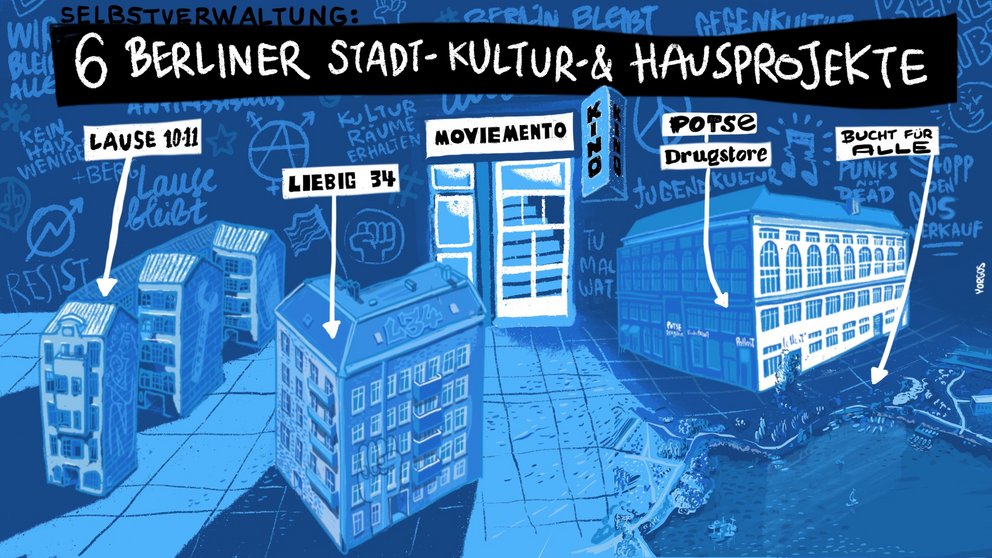
Key initiatives from the campaign #KeinHausweniger and other movements had planned on discussing the importance spaces of solidarity and self-organisation have with regards to affordable living and working space, inexpensive culture, protection against discrimination and neighbourhood structures. Instead, you can read here the current demands of the guests, again visualised by Yorgos Konstantinou.
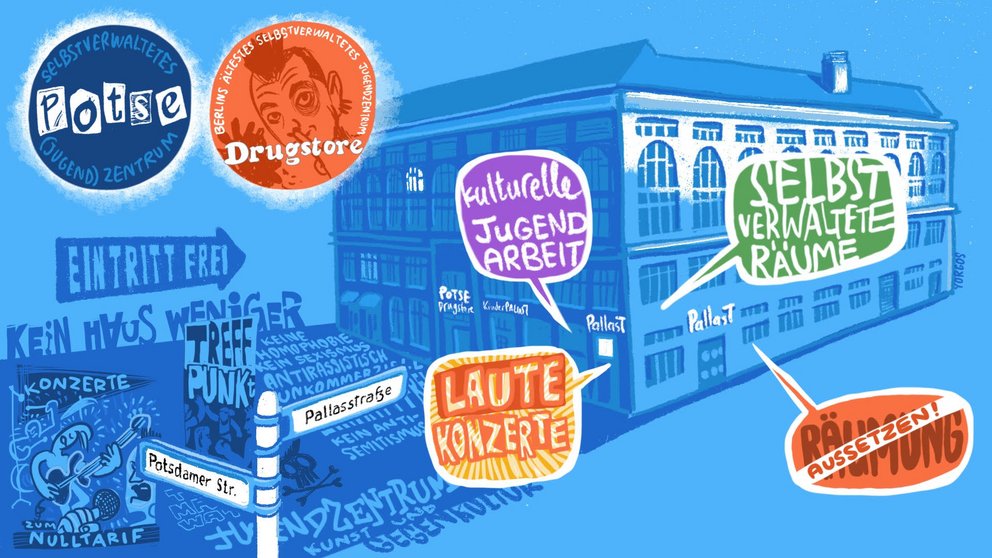
Drugstore and Potse
Two self-organised (youth) centres in Berlin-Schöneberg. The drugstore exists since 1972 and has been in exile since 2019. Currently the collective is fighting for the soonest move into a new space that already exists.
What are your key demands?
Our long-term solution is: self-organised spaces in which we (Drugstore and Potse) can implement our entire programme of cultural youth work (concerts, rehearsal rooms, workshops) and which are easy to reach. Our short-term solution is: stopping the eviction of Potse on the 2nd floor of Potsdamer Str. 180 and the prompt completion of work on the temporary rooms for the youth centres at Potsdamer Str. 134-136. The contract was signed over a year ago and the renovation and conversion work still has not been finished.
Who are these demands addressed to?
Our demands are directed at the district of Tempelhof-Schöneberg, as well as the Bundesland Berlin.
Have your demands changed due to the current social situation as a result of the coronavirus pandemic? If so, how?
Our demands were already topical before the crisis. Now they have become much more urgent, as youth work and functioning youth centres will be essential in cushioning the various blows of the corona crisis.
Further information:
http://www.drugstore-berlin.de/ and https://potse.squat.net/
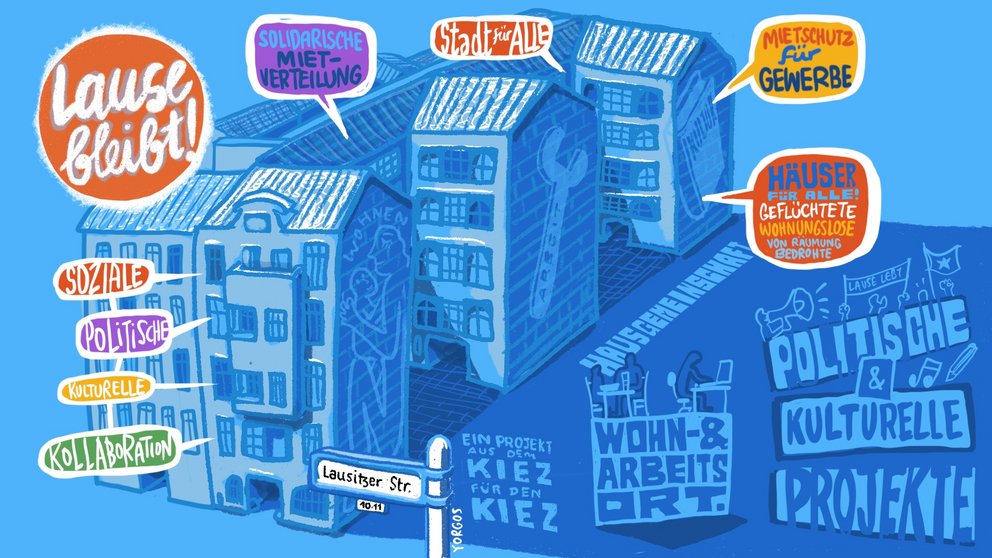
Lause bleibt!
A living and work space for cultural and political projects in Berlin-Kreuzberg. In 2016 it was announced that the building was to be sold. This has not happened until today.
What are your key demands?
As Lause, we are involved in the struggle for an urban development based on solidarity. We don’t see ourselves as an isolated house project but rather as part of the struggle for a city for everyone. We’re campaigning against houses being rented out as commercial properties in order to circumvent any tenant protection. We demand that the houses Lausitzer Straße 10 and 11 be permanently withdrawn from the market. We want to transfer these houses into our own or a jointly selected trusteeship. We want to use areas in the house and courtyard for political, social and cultural collaboration and cooperation. As a housing community, we want to collectively select our tenants, split the rent based on solidarity and for the buildings to be renovated in a way that doesn’t force us out.
Who are these demands addressed to?
Our demands are addressed to the city of Berlin and property owners.
Have your demands changed due to the current social situation as a result of the coronavirus pandemic? If so, how?
We are artists and craftspeople, small businesses from graphic designers to one-woman booking agencies, NGOs and precariously employed scientists, political creatives and freelance writers – and we are all losing our income in the current crisis. We are fighting to not lose the very last means of production we have left: our office, our workshop, our studio. The safety nets now being stretched over large companies leave us feeling the brunt of the falling debris. As an absolute minimum, we therefore demand that the city of Berlin, but also the city’s property owners, at least secure our spatial existence! Housing communities like ours, Lause, are social laboratories: mutual support with paying rent, information exchange and virtual meetings are our answer to the isolation of quarantine. We’re joining the fight for houses for everyone: refugees, the homeless and those in danger of eviction.
Further information:
https://lause10.de/
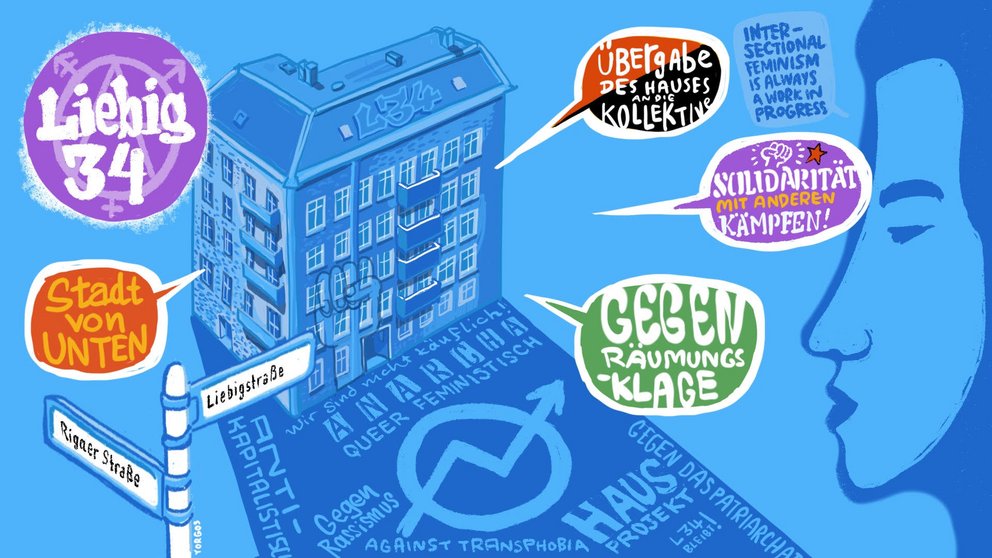
Liebig34
An anarcha-queer-feminist house project in Berlin-Friedrichshain which has been occupied since 1990. An action for eviction is currently being filed against the project.
What are your key demands?
We demand that ownership of the house at Liebigstr. 34 be transferred without payment to our collective. We stand with other struggles for a city organised from below. We are not just fighting for our very existence – we’re also part of a tenants’ movement. We would like to express our solidarity with other projects facing eviction.
Who are these demands addressed to?
To our allies in the fight against patriarchy, capitalism and racism, in order to increase extraparliamentary pressure. Our demands are not directed at the Senate or property owners. Our experience shows that within the logic of capitalism, these players use repression to their own advantage. We want to smash this logic.”
Have your demands changed due to the current social situation as a result of the coronavirus pandemic? If so, how?
The corona crisis shows that we must fight capitalism. It is necessary to find new answers to worsening conditions and the sell-out of the city, for example through rent strikes and occupations.
Further information: www.liebig34.blogsport.de
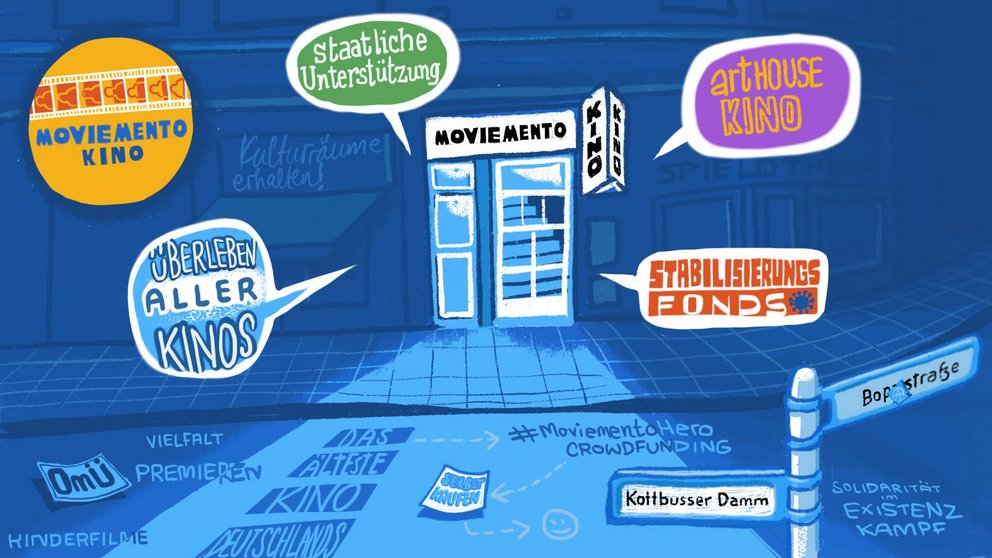
Moviemento Kino
Moviemento was founded in 1907 and is one of the oldest cinemas in Germany. After the announced sale, the operators would like to acquire the premises themselves in order to preserve the cultural venue in Berlin-Kreuzberg.
What are your key demands?
We are thrilled at the success of our #MoviementoHero crowdfunding campaign last year. We are currently in talks with the owner and are optimistic that Moviemento has a future. But now the situation for us is as follows: HDF (Hauptverband der deutschen Filmtheater/Association of German Cinemas) has already published some concrete numbers. According to these, the coronavirus pandemic is expected to result in the loss of almost 40 million cinema visitors this year. While the revenue structure of a cinema is directly linked to the number of visitors, the cost structure remains largely unchanged. The HDF is therefore calling for a stabilisation fund to directly subsidise the operating costs of cinemas with 4.62 euros per lost visitor. These figures refer to the true overhead costs which have already been adjusted for furloughed employees etc. Simply put: it’s a matter of survival for each individual cinema. And arthouse cinemas are most at risk because of their cultural, rather than profit-driven, focus.
Who are these demands addressed to?
To Bund und Länder.
Have your demands changed due to the current social situation as a result of the coronavirus pandemic? If so, how?
Most cultural venues and practically all cinemas have no income at all at the moment. The consequences of this current creative intermission will lead to a loss of revenue after reopening for all cultural institutions well into next year, which will threaten their very existence. This is why we now need enormous state support, even after the break. Cinemas, theatres and other cultural institutions require a pre-production period that starts with just a screenplay. As a result, the effect of postponed shoots and release dates in cinema will continue to be felt significantly later on. Our audience needs and wants us: countless people have already shown this through their support at startnext.com/fortsetzungfolgt.
Further information: www.moviemento.de
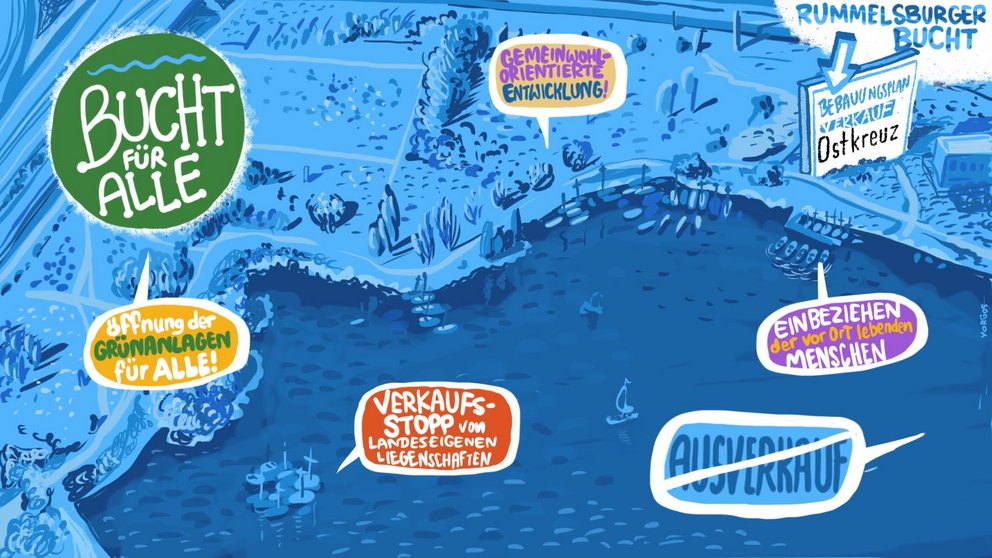
Bucht für Alle
Last year, the initiative Bucht für Alle gathered 35,000 signatures for an alternative development plan for the area Ostkreuz/Rummelsburger Bucht in Berlin-Friedrichshain and Berlin-Lichtenberg.
What are your key demands?
Our goals for the bay were:
1. To review and amend the planning objectives for the area Rummelsburger Bucht and the Ostkreuz development plan
2. A public buy-back initiative for the privatised plots of land in question
3. Comprehensive development that is in the public interest through leasehold contracts, cooperatives and public bodies relating to the area concerned
4. Green spaces that are open to everyone instead of a self-serving public-private partnership contract (waterpark)
5. The inclusion of local people (those without a fixed address, caravan park residents, cultural workers and local residents) in the new planning
Our general goals remain the same:
1. To change the Senate’s real estate policy and move from a policy of selling off the city towards the development of areas for the common good
2. A blanket ban on the sale of state-owned properties to private investors
3. The creation of a city-wide task force to deal with current and future disputes in urban development in a constructive way (in the public interest and for the common good)
4. Full transparency with contracts, professional assessments, procedures, decisions and vacancies concerning properties, development projects and land usage in Berlin
Who are your demands addressed to?
To the Senate and the Berlin House of Representatives/parliament, as well as the district parliaments and the respective district policymakers. Political parties must be judged on the implementation of this development plan and the way they have dealt with affected citizens in the coming election.
Have your demands changed due to the current social situation as a result of the coronavirus pandemic? If so, how?
No, they haven’t changed in light of the coronavirus pandemic. Precisely during a global crisis, society has to be capable of listening to and protecting those who live in precarious situations. If it doesn’t do this, its claims of democratic and social principles ring hollow. The eviction of people living in tents at Rummelsburg Bay is a social disgrace and a testament to political incompetence. At the same time, the ignorance of the federal government concerning refugees in tent camps such as Moria on the island of Lesbos in Greece or those in the Mediterranean is an atrocity and an unspeakable act of violence. We therefore demand a Berlin that is open to the whole world.